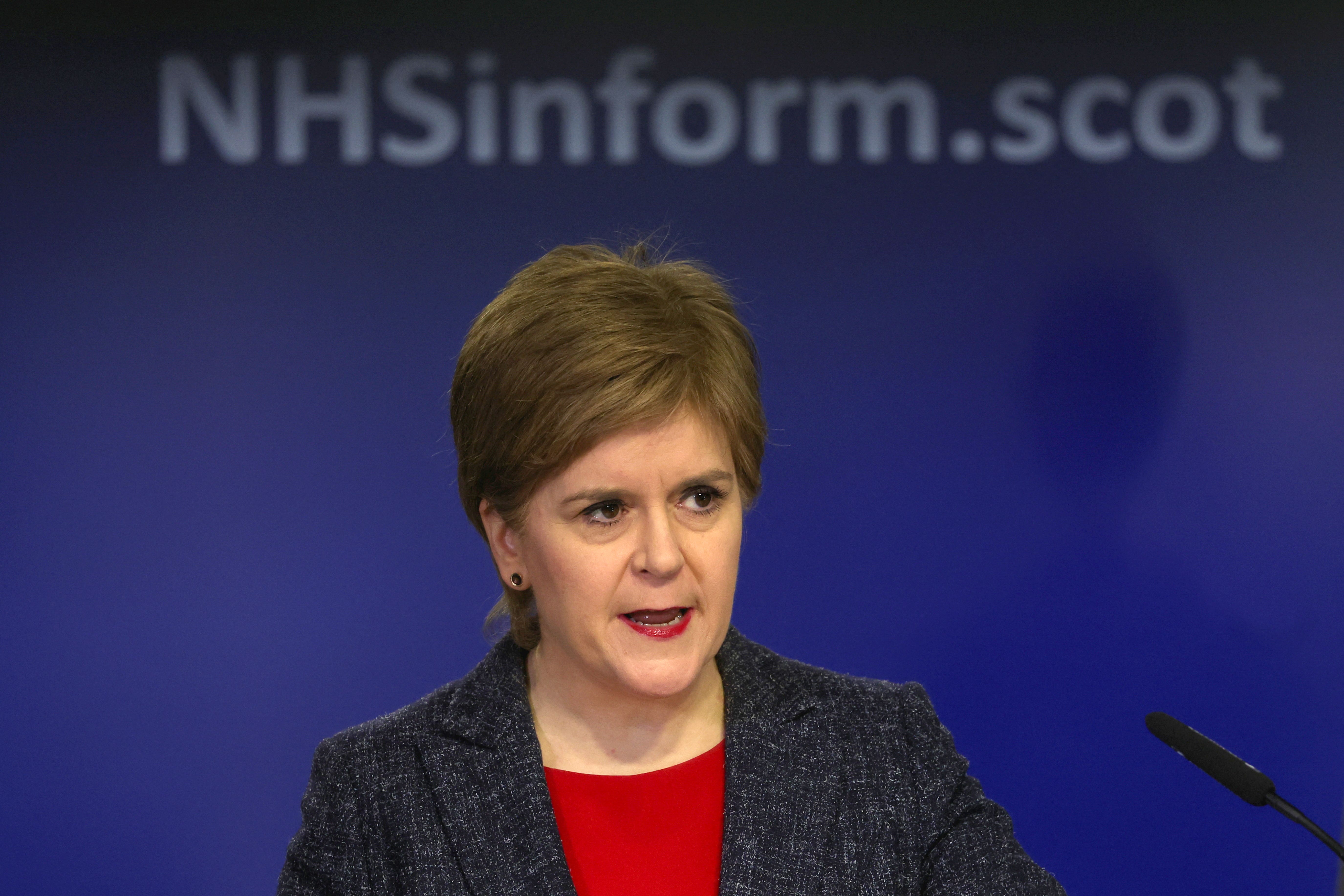Scotland’s hospitals almost ‘completely full’, warns Sturgeon
The First Minister has set out measures to address the growing pressures facing the NHS in Scotland.

Your support helps us to tell the story
From reproductive rights to climate change to Big Tech, The Independent is on the ground when the story is developing. Whether it's investigating the financials of Elon Musk's pro-Trump PAC or producing our latest documentary, 'The A Word', which shines a light on the American women fighting for reproductive rights, we know how important it is to parse out the facts from the messaging.
At such a critical moment in US history, we need reporters on the ground. Your donation allows us to keep sending journalists to speak to both sides of the story.
The Independent is trusted by Americans across the entire political spectrum. And unlike many other quality news outlets, we choose not to lock Americans out of our reporting and analysis with paywalls. We believe quality journalism should be available to everyone, paid for by those who can afford it.
Your support makes all the difference.Scotland’s hospitals are “almost completely full”, the First Minister warned as she outlined measures to ease pressure on the NHS.
In a news briefing alongside Health Secretary Humza Yousaf and the deputy chief medical officer, Graham Ellis, Nicola Sturgeon admitted it had been “without any doubt the most difficult winter ever” for the health service.
It comes as Dr Lailah Peel, deputy chair of BMA Scotland, warned that hospitals were “not safe” for patients amid increasing pressures.
Ms Sturgeon said hospitals across Scotland surpassed 95% capacity on January 4, compared to pre-pandemic levels of 87%.
The reality is hospitals right now are currently almost full
She said: “The reality is hospitals right now are currently almost full. Last Wednesday, hospital bed occupancy across Scotland exceeded 95%.
“Now for context, at the same stage in 2020, before the pandemic struck, occupancy was around 87%”.
Ms Sturgeon said “extraordinary levels of winter flu” and rising Strep A cases were to blame, alongside delayed discharges – where a patient is ready to leave hospital but cannot because the necessary care package or accommodation is not available.
An estimated 1,700 people are still in hospital but are ready for discharge, she said.
Ms Sturgeon said “immediate extra funding” will be provided to health and social care partnerships to support the booking of additional care home beds for patients to be discharged to while they await an appropriate care package.
Additional staff for the NHS 24 service is also set to increase in the coming weeks after workforce numbers were increased prior to the festive period to reduce the need for hospital visits.
The Scottish Government is also working with health boards to assess initiatives such as extending GP opening hours to Saturdays, as announced by NHS Lanarkshire last week.
Ms Sturgeon said: “While NHS staff continue to deliver excellent care – truly excellent care – for thousands of patients each and every day; in some key areas, the system in not currently providing patients with the speed of treatment that we want to see.”
Mr Yousaf is expected to update the Scottish Parliament on the new measures in a statement on Tuesday.
During the media briefing, Ms Sturgeon, Mr Yousaf and deputy chief medical officer Graham Ellis were asked if they used private healthcare.
Both ministers replied that they did not, while Prof Ellis said his family had done so.
Rishi Sunak refused to say whether he uses private healthcare during a BBC interview at the weekend, saying his own case was “not really relevant”.
Dr Iain Kennedy, chair of BMA Scotland, said 95% bed occupancy was “just not sustainable”.
Efforts to control delayed discharge were welcome, however, he warned it will be ineffective unless additional staff are recruited in the social care sector to combat the increase.
He added: “Scotland’s NHS isn’t sustainable within the resources – both staff and financial – we are willing to provide it with.
“We have to get serious about this and have a proper, long term discussion about the future of our health service rather than just struggle to survive from crisis to crisis.”
Donald Macaskill, chief executive of Scottish Care, said the care sector was “ready and willing to respond to the pressures the wider health system is facing” but stressed it “can only do so within the constraints it itself is facing”.
Scottish Labour’s Jackie Baillie accused the First Minister of spending “more time making excuses” than addressing the health concerns.
She said: “Faced with the most difficult winter in NHS history, the SNP are deflecting blame and rehashing the same old promises they have been making for years.
“These changes will barely scratch the surface of this deadly crisis and fail to grapple with the major structural problems clinicians are raising.”
Tory MSP Sandesh Gulhane said the Scottish Government was “missing in action” over the holiday period.
He said: “Nicola Sturgeon was full of sympathy for let-down patients and warm words for over-stretched staff – but there were precious few, concrete measures to turn things around.
“This PR exercise was too little, too late.
“She and Humza Yousaf remain in denial of the fact that they’ve been caught off guard by the extent of the demands on the NHS this winter, despite the fact that they were warned of what was looming well in advance.”